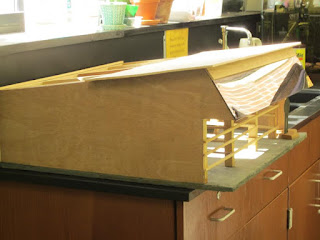Editor's Note: This blog is part of a
series of guest contributors from the national school-based
agricultural education family. Ms. Rachel Sauvola is a 17 year teaching
veteran at New Richmond High School in Wisconsin. She's active within her
school and professional organizations, in addition to serving on the Executive
Boards for the New Richmond Area Community Foundation and the Five Loaves Food
Shelf. Rachel and her husband, Dean have two daughters - a three year old
named Iris and a fourth grader named Abby. In her free time she enjoys
traveling and scrapbooking!
 |
| The Greenhouse Lab Manager helps with plant maintenance |
There are "rules" to Independent Study in my world. The students who embark on one MUST leave a legacy for others to learn from. They must have a finished product that can be showcased to students, parents, community members and/or beyond. They must work diligently to make a difference!
So let me give you some examples. For Independent Study credit, I have two students who serve as managers for the Aquaculture Lab, one manager who oversees my Large Animal Science Learning Center, one manager for my Small Animal Science Learning Center and one for my greenhouse. When they are managers, they are in charge of complete operation of the facility. They order materials, pick up supplies, clean, sort, organize, process and complete health care binders for all living things and conference with me regularly. They keep a journal and are in constant communication through conversations and Google docs. Those students are leaving a legacy and providing live creatures for their classmates to study, obtaining more community partnerships as customers for products we produce, advocating for the program, seeking donations of new plants and animals for others to learn about and honing valuable recordkeeping and communication skills.
The Animal Learning Center Managers take care of these fabulous creatures and many more -
 |
| Roscoe, our bull calf, who will turn steer very shortly.... |
 |
| Anna, the Boer goat who often escapes for added daily adventure.... Notice how sweet she looks right now.. |
 |
| Peka, our chinchilla.... |
 |
Geno, Snickers and Charlie, our rabbits...
These little buggers make my throat swell shut the worst, but they sure are cute!
|
 |
Here is a model he built of the barn we will build on school grounds - A community partner made the figurines to scale for our presentation purposes.
|
 I pitch these ideas to my Independent Study students and they take them on. An example for you - A senior student did all the legwork for us to be able to build a barn on campus last school year - contacting community partners to assist with all areas of the building process. He presented to the Admin team and the School Board, while I sat in the wings waiting to answer any questions. Our ultimate goal with our operation is to provide beef for school lunch. We're moving forward on this exciting endeavor because he did such a great job!
I pitch these ideas to my Independent Study students and they take them on. An example for you - A senior student did all the legwork for us to be able to build a barn on campus last school year - contacting community partners to assist with all areas of the building process. He presented to the Admin team and the School Board, while I sat in the wings waiting to answer any questions. Our ultimate goal with our operation is to provide beef for school lunch. We're moving forward on this exciting endeavor because he did such a great job! |
Pictured are the two students who are using the legacy
left behind from last year to improve our systems for this year.
|
Another two students, studied some pictures of aquaponic operations, did some reading, obtained all the supplies, problem solved and built five systems so that we could provide lettuce to our school lunch salad bar and herbs to our Family and Consumer Science program or FFA members' homes.
I have a few dozen more examples of students who have taken this route. They are the definition of inquiry learners. They are charting their own course, learning valuable agricultural information and necessary life skills. They are advocates for the program. Most of all, their learning lightens my workload and leaves a legacy for others to learn from for many years to come.
How can you embrace this concept and make it work for you? How can you offer your students course credit for going above and beyond? How can your students help you work smarter, not harder?
Please let me know if I can help you in any way!
Rachel Sauvola
New Richmond High School
701 E. 11th Street
New Richmond, WI 54017
715-243-1761
rsauvola@newrichmond.k12.wi.us
@MrsSauvola




